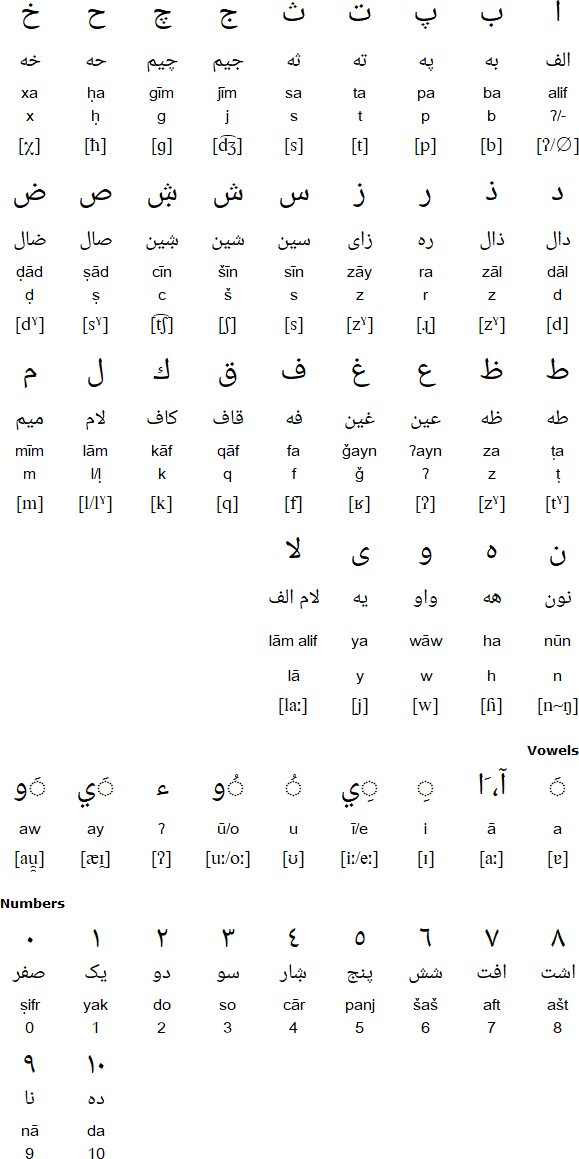Kumzari is a Western Iranian language spoken by about 6,060 people mainly in northern Oman, and also in southern Iran. In Oman it is spoken by about 5,360 people on the Kumzar coast of the Musandam Peninsula. The majority of Kumzari speakers live in the village of Kumzar, after which the language is named, There are also speakers in the towns of Dibba and Khasab, and the villages of Elphinstone and the Malcolm Inlets.
There are about 700 speakers of Kumzari on Larak Island, which is part of Qeshm County in Hormozgan Province in southern Iran.
Kumzari is also known as Kumzai, Komzāri or Komzari. It is closely related to Luri and Achomi, and has influences from Arabic, Persian, French, Portuguese and English.

Download an alphabet chart for Kumzari (Excel)
قصتی مآمی حکآیتی تیسکن یعنی. رفت ﻭآحد مردکیه حبوﻭآ یی رﻭکی آ حبو ﻭآ یی. مآم یی مرسی بپ یی مرسی یعنی روکی نه حبو ﻭآ یی. سآتی ﻭآ یی آرضی آرضی ﻭآ یی یعنی.
Qiṣṣite māme ḥakāyite tīskan yaʔnī. Raft wāḥid mardkeā ḥubbo wā ye roke ā ḥubbo wā ye. Mām ye murse bap ye murse yaʔnī roke na ḥubbo wā ye. Sāte wā ye arḍe arḍe wā ye yaʔnī.
A story great to tell. That is to say, a tale. There was a certain man who had a grandmother. That boy, he had a grandmother. His mother had died. His father had died. But that boy had a grandmother. Now, some property was in his possession. That is, he had a plot of land.
Details supplied by Michael Peter Füstumum
Information about Kumzari | Numbers
Information about Kumzari
https://en.wikipedia.org/wiki/Kumzari_language
https://www.ethnologue.com/language/zum
https://www.endangeredlanguages.com/lang/3093
https://www.academia.edu/12785725/Consonantal_and_Vocalic_Phonemes_of_Kumzari
Avestan, Bactrian Baluchi, Bartangi, Dari, Gilaki, Hazaragi, Ishkashimi, Judeo-Persian, Juhuri, Khufi, Kumzari, Kurdish, Luri, Mazandarani, Munji, Ossetian, Ormuri, Oroshor, Persian, Parthian, Pashto, Rushani, Sanglechi, Sarikoli, Shabaki, Shughni, Tajik, Talysh, Tat, Wakhi, Wanetsi, Yaghnobi, Yazghulami, Yidgha, Zazaki
Adamaua Fulfulde, Afrikaans, Arabic (Algerian), Arabic (Bedawi), Arabic (Chadian), Arabic (Egyptian), Arabic (Gulf), Arabic (Hassaniya), Arabic (Hejazi), Arabic (Lebanese), Arabic (Libyan), Arabic (Modern Standard), Arabic (Moroccan), Arabic (Najdi), Arabic (Sudanese), Arabic (Syrian), Arabic (Tunisian), Arwi, Äynu, Azeri, Balanta-Ganja, Balti, Baluchi, Beja, Belarusian, Bosnian, Brahui, Chagatai, Chechen, Chittagonian, Comorian, Crimean Tatar, Dargwa, Dari, Dhatki, Dogri, Domari, Gawar Bati, Gawri, Gilaki, Hausa, Hazaragi, Hindko, Indus Kohistani, Kabyle, Kalkoti, Karakalpak, Kashmiri, Kazakh, Khowar, Khorasani Turkic, Khwarezmian, Konkani, Kumzari, Kurdish, Kyrgyz, Lezgi, Lop, Luri, Maguindanao, Malay, Malay (Terengganu), Mandinka, Marwari, Mazandarani, Mogholi, Morisco, Mozarabic, Munji, Noakhailla, Nubi, Ormuri, Palula, Parkari Koli, Pashto, Persian/Farsi, Punjabi, Qashqai, Rajasthani, Rohingya, Salar, Saraiki, Sawi, Serer, Shabaki, Shina, Shughni, Sindhi, Somali, Soninke, Tatar, Tausūg, Tawallammat Tamajaq, Tayart Tamajeq, Ternate, Torwali, Turkish, Urdu, Uyghur, Uzbek, Wakhi, Wanetsi, Wolof, Xiao'erjing, Yidgha
Page created: 11.01.22. Last modified: 12.01.22
[top]
You can support this site by Buying Me A Coffee, and if you like what you see on this page, you can use the buttons below to share it with people you know.

If you like this site and find it useful, you can support it by making a donation via PayPal or Patreon, or by contributing in other ways. Omniglot is how I make my living.
Note: all links on this site to Amazon.com, Amazon.co.uk
and Amazon.fr
are affiliate links. This means I earn a commission if you click on any of them and buy something. So by clicking on these links you can help to support this site.
[top]